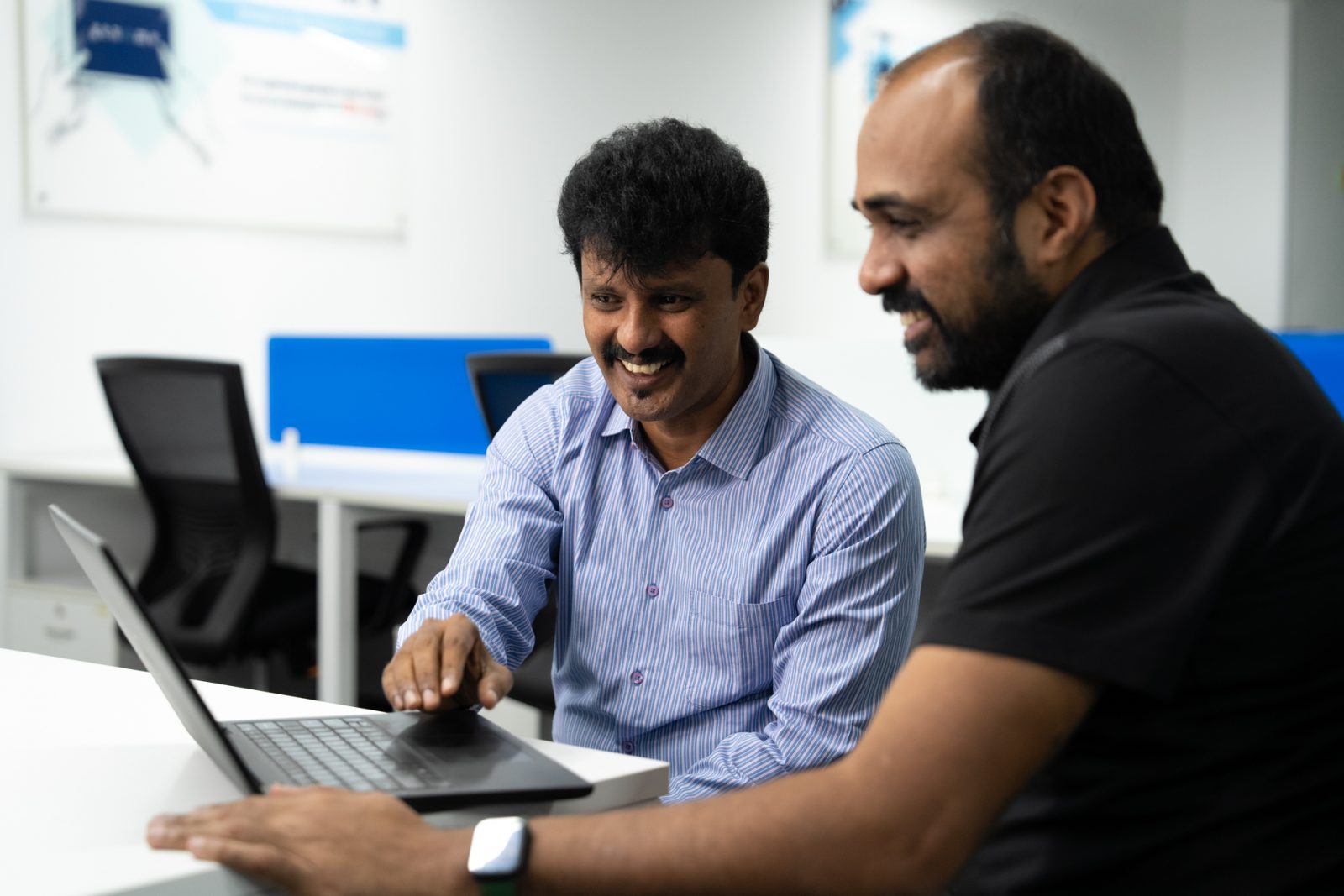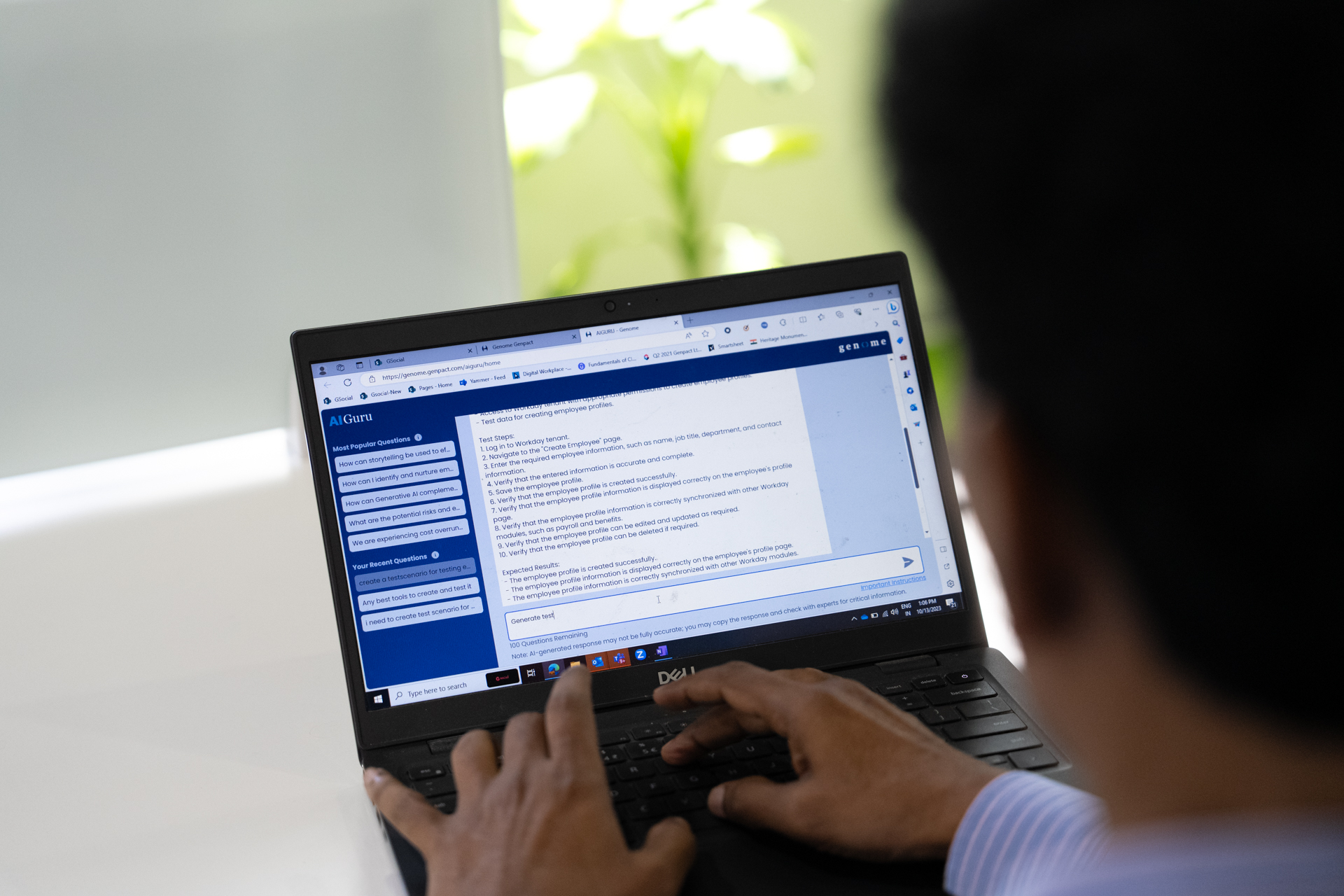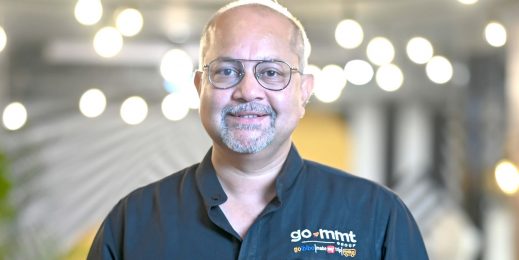
Ask AI Guru: Genpact turns to generative AI to help employees learn
TN Senthil Kumar, a Bengaluru-based IT project lead for a global company, was facing a challenge many managers deal with – how to manage friction within his team.
He turned to higher-ups for help and got some useful tips: Pre-define the team members’ activities. Focus on goals. Refrain from massaging egos.
The source of this wisdom wasn’t a person, at least not directly. It was a generative AI chatbot called AI Guru rolled out in July by Kumar’s employer, NYSE-listed Genpact Ltd., as part of its internal learning platform.
Since then, Kumar says, “I’ve asked AI Guru so many things.”
AI Guru helped his team with the IT migration to a new enterprise platform, including generating test cases for hiring and onboarding – and yes, AI Guru gave him sound management advice too.
Generative AI, built on large language models (LLMs) that synthesize vast troves of data to generate text, images and more, hit the news late last year and is seen as the biggest technological leap since the web browser and smartphones. Businesses are rolling out generative AI tools to assist employees in doing everything from writing computer code to drafting emails.
At Genpact, the focus is on boosting employee learning and development, a crucial component when your business is professional services.
Genpact, which last year booked revenue of USD$4.4 billion from a global roster of clients, is using Microsoft Azure OpenAI Service and Azure AI Services to scale up the development of courses, pull content from its own experts and constantly update materials. Most recently, it rolled out a digital twin of Genpact experts available to be consulted 24/7, so time-pressed senior executives can quickly get answers.
“There is the whole concept of collective intelligence,” said Kunal Dureja, who leads Genpact’s learning technologies and is based in Gurugram, the corporate hub on the edge of New Delhi. “People learn with each other. If you look at how we curate content, everywhere you see there is the element of the power of the team as opposed to having just one point of view.”
Genpact started in 1997 with 20 employees as a subsidiary of GE that handled the US conglomerate’s finance and accounting functions globally. It now employs over 115,000 people in over 30 countries.
Piyush Mehta, Genpact’s chief human resources officer, remembers the early days of the company when they hired fresh graduates and swiped people from other industries like airlines and hotels. “The joke was that there used to be a sign outside the office that said ‘Trespassers will be recruited’,” he said.
Genpact’s success depends on its employees keeping abreast of the latest in digital technology, domain and process expertise to serve its clients globally. “We didn’t have a choice,” said Mehta, who is based in Gurugram. “We had to skill and reskill across the board if we wanted to grow.”
Today, Genpact hires 40,000 to 50,000 entry-level employees each year, all of whom also need training.
Like many others, Genpact used to rely on a mix of on-the-job learning and training programs run by vendors, in scheduled classroom settings, with a real-life guru.
But the old-fashioned way of signing up for physical classes, at scheduled times, just wasn’t keeping up. Vendor content was often generic and outdated and class times inflexible.
In 2019, the company decided to put most of its learning online. Mehta and Genpact’s then chief innovation officer, Gianni Giacomelli, were tasked full time with building a platform. They called it Genome, to reflect the idea that learning was part of the company’s DNA.

They identified 40 skills most important for growth, ranging from accounts payable and data literacy to commercial negotiation. Using email analysis from Microsoft Viva Insights, they identified “master gurus,” people with 20 years’ experience or more who were sought out within the company for these skills. (The exception was Europe, where laws do not allow such meta data harvesting of emails.)
These master gurus were recruited to curate courses, add Genpact specific content and answer questions on online forums; their answers are then rated. Peers review each other’s work at the end of each course. Today, between 40 and 50 percent of course content comes from internal expertise. Tasks people do as part of their everyday jobs are curated and indexed and become part of a body of knowledge to be drawn from.
The platform has grown rapidly. There are over 50,000 learners on Genome every month. The most popular course by far this year, not surprisingly, has been an introduction to generative AI: 60,000 employees have taken it. Storytelling is the next most popular course, particularly with sales and marketing teams, followed by people management, which has evolved rapidly in the age of hybrid teams. Next come role-specific courses like supply chain, fraud and accounts payable.
The number of skills has doubled from the initial 40 to 80, and there are 600 gurus and master gurus to, as Shalini Modi, global leader for learning and employee experience, puts it, “take you from darkness to light.”
Before starting a course, learners rate themselves on proficiency – 1 for beginner, 4 for proficient – so they get content that’s right for them. They are also recognized in various ways – virtual badges they can post on their LinkedIn profiles, a shout-out of the top ten Genome learners from CEO Tiger Tyagarajan at global town halls, and ultimately, deeper engagement and enhanced prospects for career development.
The impact on retention is tangible. Those who’ve enrolled for training on Genome, said Mehta, are twice as likely to stay with the company as those who have not.
By early 2023, Genome had exponentially boosted learning at Genpact. But there remained a bottleneck – the number of master gurus. That’s where generative AI came in.
In July, the Genome team rolled out a chatbot called AI Guru, a digital twin of all the gurus collectively, powered by OpenAI’s GPT-3.5 via Azure OpenAI Service, available around the clock. Trained on three years’ worth of course content and questions and answers from the company’s intranet hosted on Microsoft SharePoint, AI Guru is now available to several thousand senior learners globally.
“Today it’s a learning companion,” said Prashant Shukla, who heads learning and content management for Genome. “The next step is guiding people on skills they should be learning. In future, we look at this as a coach for specific roles. For a first-time manager who needs constant coaching – they can talk to it.”
As of mid-September, 400 people had asked AI Guru 1,500 questions, including Kumar’s on how to more effectively manage his team.
“This has actually given time back to everyone,” said Crina Ilie, who leads Genpact human resources for EMEA, based in Bucharest, and is a Master Guru for People Leadership. “It used to take 15 to 20 minutes to compose a response to a forum question. Now it’s instant.”
Ilie, who has been involved in the design of Genome from the beginning, is enthusiastic about the technology but clear that human interaction is still important. There are some things AI Guru cannot replace.
“As much as we love technology, we are still human beings,” she said. “It’s good to experience some cohort learning and building leadership is easy when sharing the same space, time, food and drink. I think, you know, this is priceless.”
And as much as AI Guru can do the work of real-life gurus, she noted, it can only disseminate what’s already known. It cannot, for example, divine the future of work.
That will still require humans to figure out.
Top image: TN Senthil Kumar, an IT project lead at Genpact, with co-worker Sridhar Gnanasekaran at their office in Bengaluru. Photo by Selvaprakash Lakshmanan for Microsoft.














